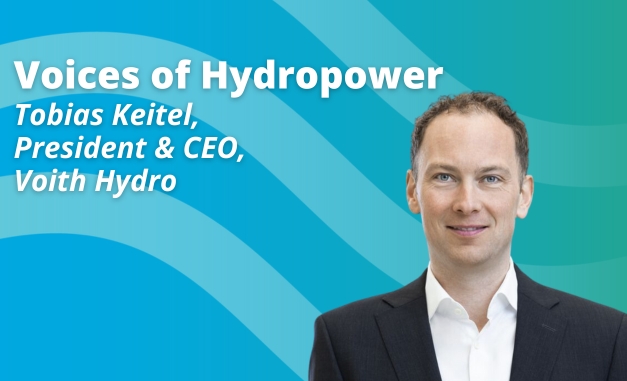The power of belief: breathing life into communities
Difficulties in recruiting a skilled workforce locally has led to the creation of an inspiring and empowering professional education programme. Women and young people are amongst thousands reaping the benefits from this scheme at the Santo Antônio hydroelectric plant in Brazil. Suzanne Pritchard reports.

What would motivate a cosmetics saleswoman to swap her glamorous make-up bag for industrial tools and protective clothing on a bustling dam construction site? In her determined search for better job opportunities to secure her family’s future, 33-year-old Edivone Araújo da Gama believed this was the right move to make.
Edivone is one of more than 1200 other women who have worked on the construction site of Brazil’s Santo Antônio hydroelectric plant, located on the Madeira River 8km away from the Rondônia state capital of Porto Velho.
Four and a half years ago she enrolled in the Acreditar Ongoing Professional Education Programme. “I didn’t think I’d get hired to work on this project but I signed up for Acreditar and took the course. Now here I am along with other women who do heavy work driving trucks, tractors and backhoes,” she says with a smile.
Translated into English, Acreditar means believe. Edivone is now one of more than 105,000 people who believe wholeheartedly in this training scheme which has been replicated in other projects across Brazil and in eight more countries.
The brainchild of Brazil’s Odebrecht Energia, origins of the Acreditar Programme can be traced back to 2008 when the company started to plan for construction of the 3150MW Santo Antônio plant. Feasibility studies for the project highlighted a lack of professionally skilled workers and such a fact was the inspiration for Odebrecht’s innovative and inspiring programme.
Hydroelectric projects are complex construction projects at the best of times, with great demands for skilled labour. As such it was disconcerting for Odebrecht to discover that the local population would only meet 30 per cent of the demand for vital skilled workers.
If the majority of labourers were sourced from outside of the town and state, it could trigger a cycle of explosive population growth. Existing social problems within the city would be exacerbated and such an influx of migrants would put greater strain on the limited urban infrastructure.
Acreditar Junior not only prepares young people for the workforce but provides them with dignity and hope for a better future."
Constructing a hydroelectric plant in the midst of the Amazon had already posed great challenges, with development needs having to be reconciled with social and environmental concerns. Mass migration of thousands of workers to the region would complicate plans to develop an economically viable, socially just and environmentally sound hydroelectric scheme. It needed to be avoided at all costs.
The belief at the heart of the programme is that well trained and educated professionals are key to achieving social and economic development.
Through the Acreditar Programme Odebrecht not only wanted to enable the local population to meet 70 per cent of the project’s demand for workers, but by training the local people it would leave behind an enduring legacy for city residents.
Free courses were offered to the local population. Training and qualifications in heavy civil engineering skills, worker safety, plus environmental and water management education, equipped the locals to enter the workforce.
When construction of Santo Antônio reached its peak 20,000 jobs were created and 80 pe cent of these were filled by residents from Porto Velho. Acreditar has also served to open the doors for women into the labour market, with 10 per cent of them accounting for hired staff at the Santo Antônio construction site.
Edivone believed in the programme so much that she decided to enrol her children in Acreditar Junior, an offshoot scheme which is also developed and implemented on Odebrecht Energia projects. As well as having theoretical and practical classes to qualify them for entry to the workforce, students receive half a minimum monthly wage and have workers’ rights.
Acreditar Junior not only prepares young people for the workforce but provides them with dignity and hope for a better future. Edivone’s son Eduardo, 17, has already graduated and Lucas, 14, is studying at the National Industrial Apprenticeship Service. Edivone’s youngest daughter, Letícia, 11, can’t wait to start the programme.
“I want to graduate, get my diploma and become a good professional in the job market,” says Lucas, who is taking the Production Assistant course. “I told my mother that once the plant is built I’m going to study English and Japanese so I can work at Odebrecht,” he says, his voice husky with emotion.
By September 2011, Acreditar had trained over 47,000 individuals in Porto Velho alone. During 2010-11 more than 1200 youngsters had been on the junior scheme. Looking to the future the programme’s influence will be felt way beyond Santo Antônio’s construction phase.
Once the project is underway and generating much needed hydroelectricity a legacy of professional and social enrichment will remain. Increasing numbers of people like Edivone and her family will continue to share the belief that their future prospects are looking much brighter.
“I used to live in a shack but when my mother joined Acreditar everything started to change,” says Lucas, the young man whose scholarship is helping to pay the bills in his family’s recently acquired brick-and-mortar house.










